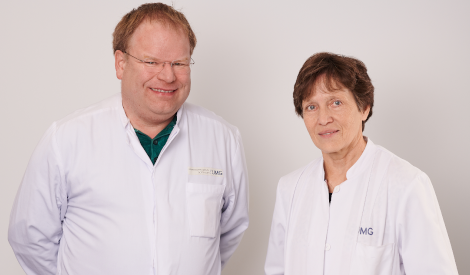Arbeitsgruppe Büntzel
Translationaler Schwerpunkt: Tumorinvasion und Metastasierung
Die Arbeitsgruppe befasst sich mit Mechanismen der Tumorprogression, insbesondere der Untersuchung von einzelnen Schritten der Metastasierungskaskade solider Tumoren.
Schwerpunkte
Einer unserer Schwerpunkte dabei ist die Rolle der Tumormikroumgebung, die – obwohl überwiegend aus benignen Zellen bestehend – die Invasivität und Verbreitung der malignen Zellen entscheidend fördert. Als Mediatoren der interzellulären Kommunikation interessieren uns vor allem extrazelluläre Vesikel, die von allen Zellen produziert werden, Botenstoffe verschiedenster Art z. T. über weite Strecken transportieren und dadurch proinvasive Signalkaskaden wie z.B. den Wnt-Signalweg aktivieren können. Der zweite Schwerpunkt der Arbeitsgruppe liegt auf der massenspektrometrischen Analyse extrazellulärer Vesikel. Da diese auch in das Blut von Tumorpatient*innen sezerniert werden, bieten sich extrazelluläre Vesikel für eine "Liquid Biopsy" an und haben Potential, die Tumordiagnostik als Biomarker zu ergänzen.
Verfahren
Die genannten Aspekte der Tumorprogression untersuchen wir sowohl in Zelllinien als auch in Metastasengewebe und Vesikelproben aus dem Blut von Krebspatienten, wobei u.a. moderne Hochdurchsatzverfahren (RNA-Sequenzierung, Proteomics, Metabolomics) zur Anwendung kommen. Mittels bioinformatischer Analyse können aus diesen Daten Signaturen erarbeitet werden, die Aussagen über die Prognose und evtl. Behandlungsstrategien von Tumorpatienten zulassen.

English version: Tumor invasion and metastasis
The research group investigates the mechanisms of tumor progression, especially the various steps of the metastasis cascade in solid tumors. We are focusing on the role of the tumor microenvironment that – although consisting predominantly of benign cells – is critical for the invasion of malignant cells.
As mediators of this intercellular communication we are particularly interested in extracellular vesicles which are produced by all cells and serve as long-distance carriers of various messengers, thus activating proinvasive signaling cascades like the Wnt signaling pathway. We investigate these aspects of tumor progression in cell lines as well as in metastases samples of different solid tumors and in extracellular vesicles from cancer patients’ blood, using – among others – state-of-the-art high-throughput methods such as RNA sequencing, proteomicsand metabolomics. Via bioinformatics analysis of these results we can eventually define signatures that provide information on prognosis and potential treatment options for cancer patients.
Tumor invasion and metastasis
The research group investigates the mechanisms of tumor progression, especially the single steps of the metastasis cascade in solid tumors. In this context we are focusing in particular on the non-canonical Wnt signaling pathway and try to characterize its role in tumor progression and to understand the underlying molecular mechanisms.
Moreover, we are analyzing the interaction of tumor cells with the surrounding benign cells of the tumor stroma, especially tumor-associated macrophages, in regard to tumor invasion. Our lab is particularly interested in the intercellular communication via extracellular vesicles. In our research we work on one specific population of extracellular vesicles, the so-called microvesicles (diameter 100-1000 nm) which are constantly released from the cellular plasma membrane. One the one hand, we try to elucidate the functional effects of tumor-derived microvesicles on neighboring stroma cells, and on the other hand, we are working on the identification of markers that will allow the detection and functional analysis of tumor microvesicles in cancer patients’ blood.
In order to better understand the mechanisms of tumor invasion, we analyze metastases samples of different solid tumors as well as cell lines and extracellular vesicles via high-troughput methods on the RNA, protein and metabolism level (RNA sequencing, Proteomics, Metabolomics). Based on the results we can then define signatures that will be correlated with clinical parameters in a translational approach and in the end can provide information about the prognosis of cancer patients.
Klinischer Schwerpunkt: Integrative Onkologie
Der klinische Schwerpunkt der Arbeitsgruppe befasst sich mit dem Gebiet der integrativen Onkologie mit besonderem Fokus auf dem Thema der komplementären Medizin.
Schwerpunkte
Krebspatient*innen kennen und nutzen Verfahren der komplementären und alternativen Medizin. Die Kommunikation über dieses Thema und eine evidenzbasierte Annäherung von Patient*innen und Behandlerteam gestaltet sich jedoch schwierig. Aktuelle Schwerpunkte der Arbeitsgruppe sind:
- Die Aufarbeitung eines evidenzbasierten, symptomorientierten Heilpflanzenkanons, der von Patient*innen und Behandlerteam genutzt werden kann.
- Etablierung von einfachen Anamnesewerkzeugen, die z.B. Ernährungsumstellung oder Nutzung von Physiotherapie erfassen.
- Untersuchung der Beziehung von Laienätiologie und Wohlbefinden auf das Nutzungsverhalten (komplementäre und alternative Medizin) von Krebspatient*innen.
Methoden
Zur Datenerhebung werden Krebspatient*innen befragt. Hier wird entweder auf etablierte Fragebögen zurückgegriffen oder es werden einfache Anamnesewerkzeuge entwickelt und in der Klinik getestet. Die Bewertung der Evidenz einer einzelnen Methode erfolgt mittels systematischer Literatursuche. Methoden der Informatik (multivariate Clusteranalyse, Netzwerkanalyse, Hauptkomponentenanalyse etc.) werden zur Auswertung großer Datensätze verwandt.
Integrative oncology
Cancer patients know and use approaches of complementary and alternative medicine. However, communication about complementary and alternative medicine as well as giving evidence-based advice is difficult for both patients and treating oncologists. Our group therefore focusses on establishing an evidence-based canon of medical plants, which is known by physicians and save to use for patients. To understand better underlying motives for choosing a specific approach of complementary and alternative medicine, we investigate the influence lay etioloy and wellbeing on patients' specific preferences. A second focus that overlaps between our clinical and translational research ist malnutrition as affected patients often report diet changes and have alterations in the metabolome (translational research) of extracellular vesicles extracted from the peripheral blood.
Publikationen
Die wichtigsten Originalarbeiten 2024 / 2025
Integrative Onkologie
- Angleitner AC, Levien L, Büntzel J. Prolonged Viral Shedding of SARS-CoV-2 in Patients With Underlying Haemato-oncological Disease. In Vivo. 2025 Mar-Apr;39(2):844-850. doi: 10.21873/invivo.13887. PMID: 40010969; PMCID: PMC11884477.
- Büthe L, Westhofen G, Hille A, Büntzel J Symptom Burden and Dietary Changes Among Older Adults with Cancer: A Cross-Sectional Study. Curr Oncol. 2024 Dec 1;31(12):7663-7685. doi: 10.3390/curroncol31120565. PMID: 39727688; PMCID: PMC11675022.
- Zedler P, Büntzel J, Kuchta K, Yamaoka D, Sato N, Watanabe K, Cameron S, Traditional clinical symptoms and signs: Kampo pattern diagnosis in moedern gastroontestinal disease. Front Pharmacol. 2024 Sep 27;15:1426491. doi: 10.3389/fphar.2024.1426491. PMID: 39403141; PMC11472708.
Translationaler Schwerpunkt
- Döring K, Malinova V, Bettag C, Rohde V, Schulz M, Menck K, Bleckmann A, Binder C, Büntzel, J. The Diagnostic Potential of Extracellular Vesicles Derived From the Blood Plasma of Glioblastoma Patients. In Vivo. 2024 Nov-Dec;38(6):2735-2739. doi: 10.21873/invivo. 13752. PMID: 39477379; PMCID: PMC11535900.
- Naser S, Schulz M, Schuchardt S, Von Hammerstein-Equord A, Büntzel J. Metabolomic Profiling of Large Extracellular Vesicles in Patients Suffering from Small Cell Lung Cancer. Anticancer Res. 2024 Nov;44(11):4729-4735. doi: 10.21873/anticanres.17299.PMID: 39477327.
Publikationen: www.researchgate.net/profile/Judith-Buentzel
Aktuelle Forschungsförderungen
Stiftung Gerdes "Identifikation eines entitätsspezifischen Metaboliten-Profils in Mikrovesikeln aus dem Blut von Patient*innen mit soliden Tumoren"
Brigitte und Konstanze Wegener Stiftung "Der Einfluss zellulärer Vesikel auf Therapieansprechen und -resistenz beim klassischen Hodgkin-Lymphom"
Team
Kontaktinformationen
- Telefon: +49 551 3966197
- E-Mail-Adresse: matthias.schulz(at)med.uni-goettingen.de
Das könnte Sie auch interessieren
